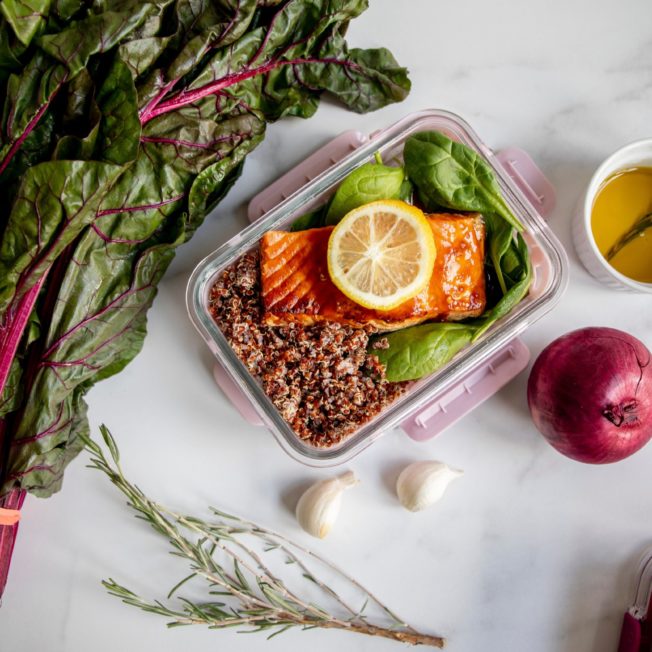In humans, there are 13 essential vitamins to take into account: vitamins A, C, D, E, and K, as well as the B vitamins, which include thiamine, riboflavin, niacin, pantothenic acid, biotin, B6, folate, and B12.
Each serves its own purpose and has its own benefit on our health and well-being. Today, let’s explore vitamin B12 and what it has to offer.
What is B12?
Vitamin B12, also known as cobalamin, is one of eight B vitamins. It is a water-soluble vitamin that naturally occurs in animal foods but can also be added to foods and supplements. Our bodies require B12 in order to form our red blood cells and our DNA, which is key for the function and development of our brain and nerve cells. Vitamin B12 will bind to the protein in the foods that we consume. Then, hydrochloric acid and enzymes will unbind the B12 into its free form in the stomach. Then, B12 will combine with an intrinsic factor, a protein so it can be absorbed into the small intestine.
In addition to the bodily processes B12 is responsible for, it is also used to help with various health issues. For example, supplements of B12 in a high dose–orally or through injections–are prescribed to treat pernicious anemia, a type of anemia where the stomach cells can’t make intrinsic factors. Symptoms of this type of anemia include weakness, pale skin, weight loss, fever, loss of balance, and memory loss. Other studies have shown that individuals with a high level of homocysteine are twice as likely to develop coronary heart disease than those with normal levels. B12 can help lower levels of this amino acid, so in some cases, doctors may recommend these individuals take B vitamins to lower their homocysteine levels.
One study also found that women who took 1,000 mugs of vitamin B12 (along with folic acid and B6) daily reduced the risk of developing the eye disease called age-related macular degeneration, while other studies have shown that women who have more folate in their diet have a lower risk of breast cancer. So as vitamin B12 works with folate within the body, it may also help reduce the risk.
What is a B12 deficiency?
Much like other vitamins and nutrients, our bodies need to function correctly; we can become deficient in vitamin B12 if we do not get or absorb enough B12 from the food we consume. It’s estimated that 1.5% to 15% of people have a B12 deficiency. At least 3% of people between 20-39, 4% of people between 40-59, and 6% of people over 60 have a deficiency in the vitamin. While a deficiency can simply be caused by a lack of B12 in your diet, it can also be affected by gastritis, pernicious anemia, digestive issues including Crohn’s disease and celiac diseases, gastrointestinal surgeries, and alcohol use disorder.
Symptoms of a vitamin B12 deficiency include weak muscles, a numb or tingling sensation in the hands and feet, having trouble walking, nausea, a decreased appetite, irritability, fatigue, diarrhea, and a fast heart rate. Risk factors are also associated with B12 anemia, including a family history of heart disease, autoimmune diseases, HIV, strict vegetarian diets, and being an older adult.
How can we increase B12 in our diets?
You can find Vitamin B12 naturally present in foods that come from animals, which includes: fish, meat, poultry, eggs, and dairy products. Foods with the highest micrograms of B12 per serving include 3 ounces of beef liver, 3 ounces of clams with no shells, 3 ounces of bluefin tuna, 3 ounces of salmon, and 3 ounces of ground beer (85% lean with 15% fat). For those who don’t eat meat, 1/4 of a cup of nutritional yeast, 1 cup of 2% milk, 6 ounces of fat-free plain yogurt, fortified breakfast cereals, 1 1/2 ounces of cheddar cheese, and one large cooked egg.
B12 supplements can also be taken to increase levels of the vitamin. However, unless you have a confirmed deficiency or a risk factor (for example, following a vegetarian or vegan lifestyle), there is likely no need to take a B12 supplement, and you should consume food sources rich in vitamins instead. Taking a B12 supplement on top of receiving natural sources can cause an excessive intake. While symptoms are rare, there is a possibility you may experience nausea, vomiting, diarrhea, or a headache.

















